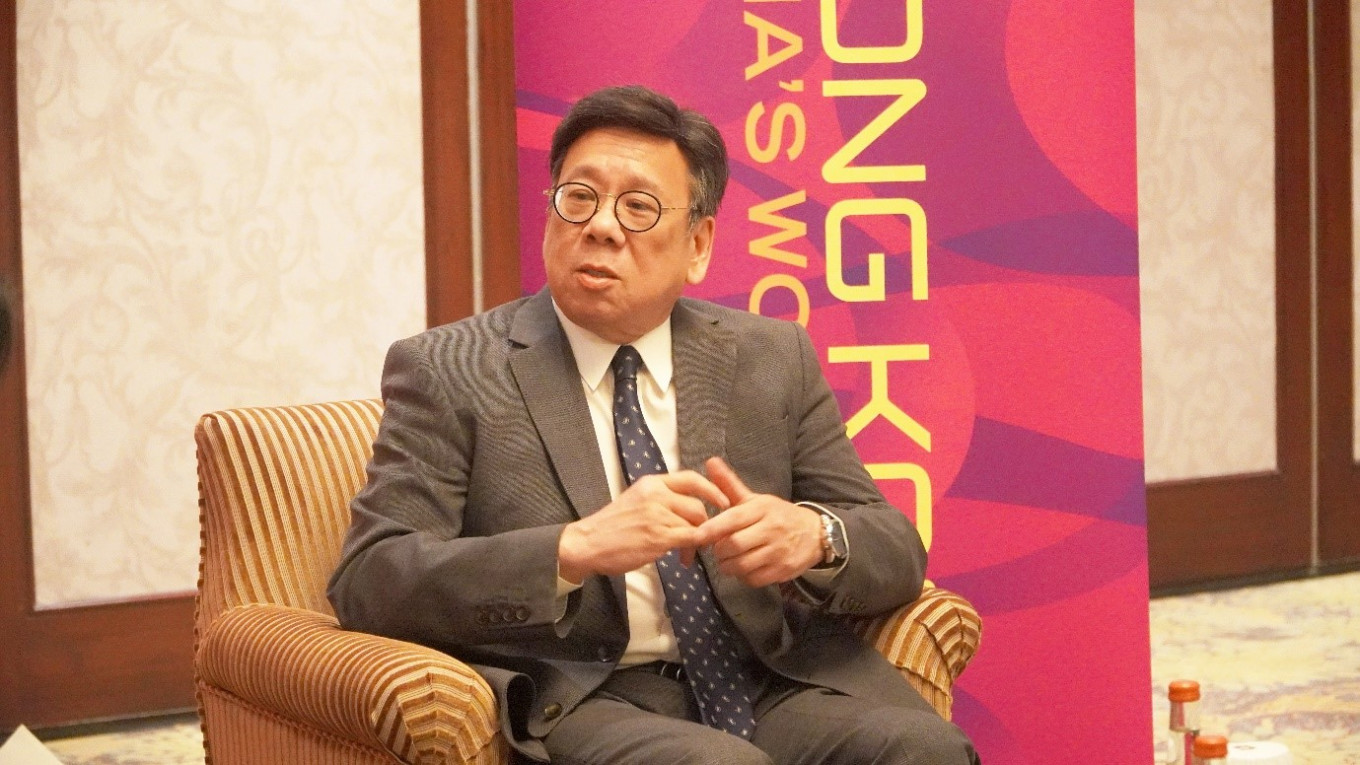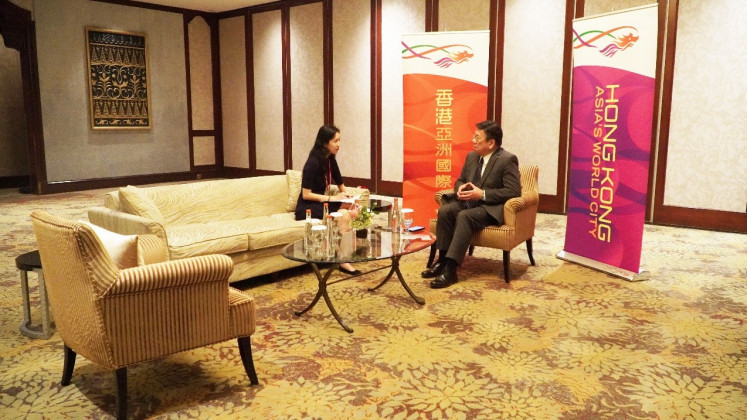Popular Reads
Top Results
Can't find what you're looking for?
View all search resultsPopular Reads
Top Results
Can't find what you're looking for?
View all search resultsHong Kong commerce minister visits Indonesia to deepen bilateral trade cooperation
To deepen the bilateral ties between Hong Kong and Indonesia, the city’s secretary for commerce and economic development, Mr. Algernon Yau, paid a visit to Indonesia to promote the advantages of the Hong Kong Special Administrative Region (HKSAR).
Change text size
Gift Premium Articles
to Anyone
T
o deepen the bilateral ties between Hong Kong and Indonesia, the city’s secretary for commerce and economic development, Mr. Algernon Yau, paid a visit to Indonesia to promote the advantages of the Hong Kong Special Administrative Region (HKSAR) in doing business and to strengthen cooperation in several aspects, such as trade.
Led by the Chief Executive of the HKSAR, Mr John Lee Ka-Chiu, a high-level delegation comprising several ministers and business leaders met with President Joko “Jokowi” Widodo upon arrival in Jakarta, with a view to forging closer economic relationship and attracting Indonesian businesses to Hong Kong after the pandemic.
“The purpose of this visit is, well, you know, the pandemic situation blocked travel and we haven’t reached out for the past three years, at least. So now it’s a good opportunity for us to come to the ASEAN countries, including Indonesia, to tell the good story about Hong Kong, and let people know that Hong Kong is back on stage and there are many opportunities in Hong Kong. And also riding on the Hong Kong opportunities, enterprises can get into the Greater Bay Area, and also participate in the Belt and Road Initiative,” Yau said.
The visit resulted in the signing of 15 memorandums of understanding (MoU) across many sectors of the economy, including finance, banking, aerospace, technology, tourism and medicine. As Indonesian businesses rank high on the list for Hong Kong counterparts, the Hong Kong Economic and Trade Office is expected to act as a facilitator for business matching. The untapped potential between the two entities will offer endless opportunities and development for all parties.
“After three years, it is also time for the business sectors to have a look at the development of the city. We just came back from riding on the high-speed rail. So that’s a new development here, which is very good, and we didn’t know about that. And this time when I come to Indonesia, to Jakarta, I’m seeing very good development, many new buildings and setups,” Yau said.
Focusing on trade, Yau noted that the trade figures from Indonesia alone came to about US$5.7 billion last year, a rise of 12 percent from the previous year, while ASEAN countries as a whole were the second largest trading partner of Hong Kong, bringing in about US$165 billion a year. Because of the nature of the island’s geography, trade has very significant implications for the economy of Hong Kong.
The number is expected to continue increasing, as Hong Kong is seeking to accede to the Regional Comprehensive Economic Partnership (RCEP), a free trade agreement among Asia-Pacific nations that Indonesia is a part of. The agreement is intended to reduce tariffs and red tape throughout the region to facilitate international supply chains and trade.
“Getting into RCEP will further strengthen access to the markets for investment, because we’ll benefit from the tariff concessions, streamlined customs procedures and then people will invest more for trade in goods and services. So that is a win-win situation to allow the ASEAN plus 5 countries to work hand in hand together on economic development. In particular, many of those economies are now recovering and Hong Kong is a place giving opportunities for the RCEP companies to use Hong Kong as a platform for getting into the Greater Bay Area. So it’s very good,” he said.
Adding that bilateral trade agreement would bring more benefits than challenges, he acknowledged that the relationship between Indonesia and Hong Kong had been well established for a long time and, therefore, opened the door to further strengthen the cooperation. Yau also said investment in Hong Kong was getting stronger because of the new policy on the financial side, through green bonds and dual currency.
Talking about President Jokowi, he revealed that the president focused more on the development of the tourism sector, investment opportunities regarding the new capital (IKN) and the Indonesian diaspora that resided and worked on the island. Hong Kong is one of the countries with the largest number of Indonesian migrant workers. According to a report by Kompas, the number of Indonesian migrant workers in Hong Kong in 2019 was 70,840. The number has since declined to 60,096 people in 2022.
“Deputy Trade Minister Jerry Sambuaga gave a very good speech in the luncheon about all the opportunities and the support of the Indonesian government to Hong Kong for getting into RCEP and all the good opportunities between Hong Kong and Indonesia. So in these couple of days, we managed to achieve what we intend to achieve - a good communication with the government, Mr. President, an exchange of views about the development here and promotion of tourism. We also had an exchange of views on talents coming to Hong Kong and the new policy introduced by our Chief Executive John Lee Ka-chiu on attracting enterprises,” Yau explained.
In addition to the RCEP, both Hong Kong and Indonesia are also connected through the Belt & Road Initiative, introduced in 2013. The Belt and Road Initiative was put together by mainland China to bring several states together for the joint development of the economy. It includes countries from Africa, Asia and Europe. This year, the Belt & Road Summit will be held in Hong Kong in September. He revealed that the summit will cover two different agendas: development in ASEAN countries and in the Middle East.
“This is an occasion for the government officials to exchange ideas and tell the participants about the policies, procedures, opportunities – and also explore cooperation opportunities between government and also between commercial sectors,” Yau said. “This year, the summit will be very different. In the past three years it was online. But this time it will be held physically. If you can shake hands, if you can give a hug to your counterpart, and talk to each other face to face, the impact and effect will be much different.”
He ended the discussion by saying that despite the geopolitical and ongoing economic crises on the horizon, Hong Kong was determined to establish closer relationships with the ASEAN countries and especially with Indonesia. Hong Kong chooses to explore opportunities rather than relying on the existing way of doing business, as it sees tremendous potential for further development in the region. Yau added that Hong Kong could act as an ideal gateway for Indonesian businesses to enter the Greater Bay Area.











